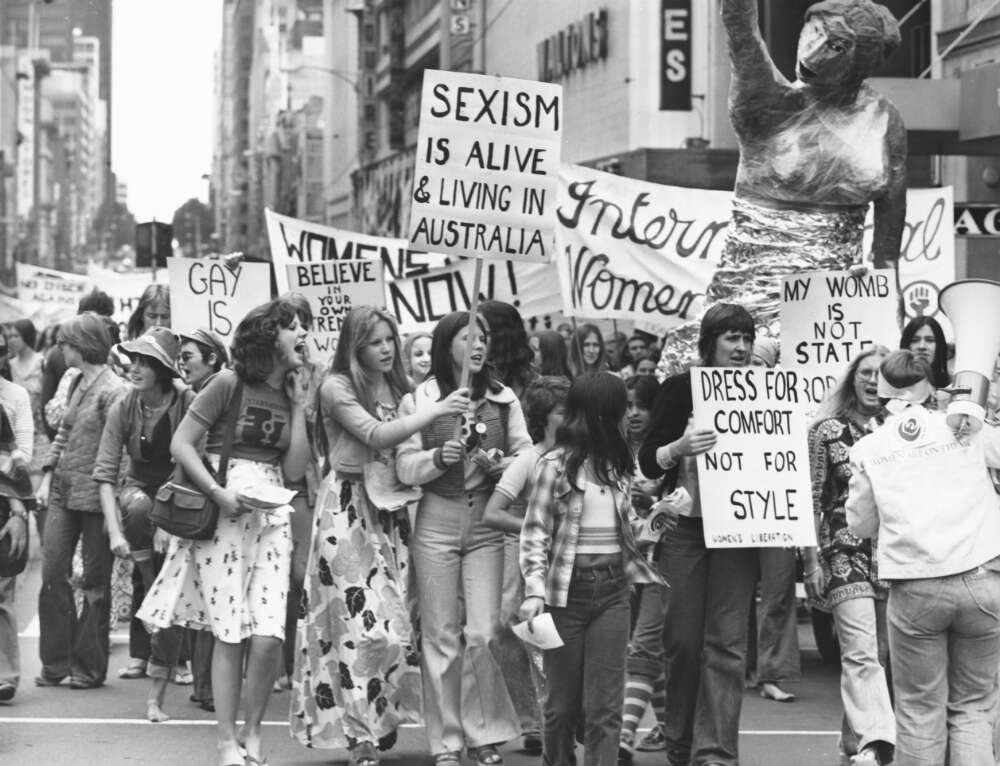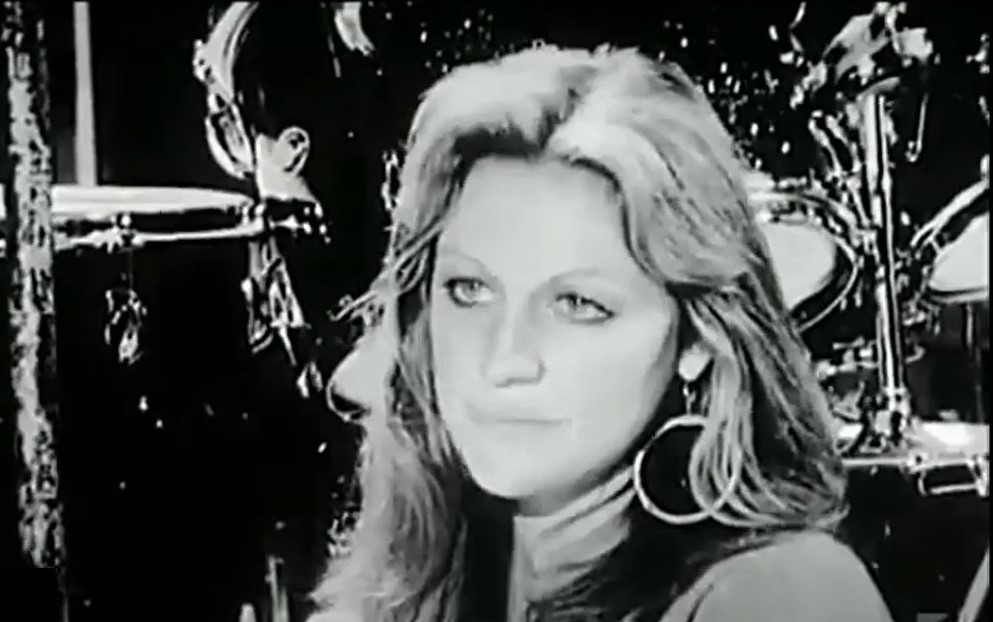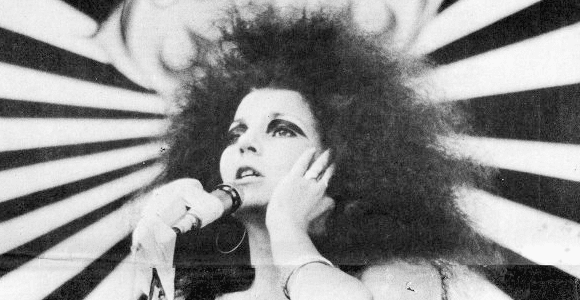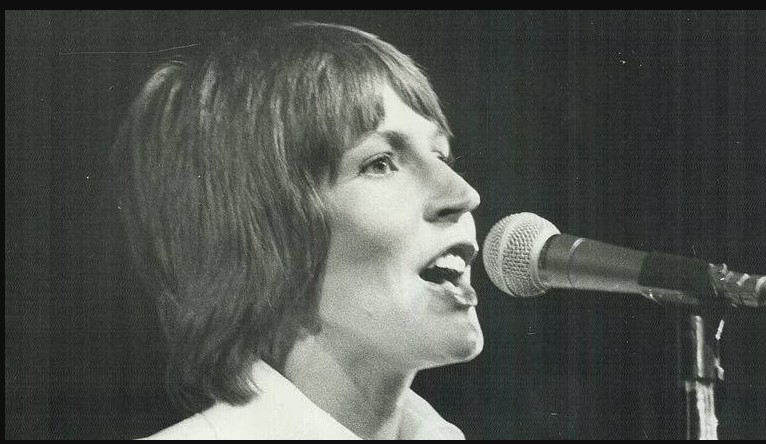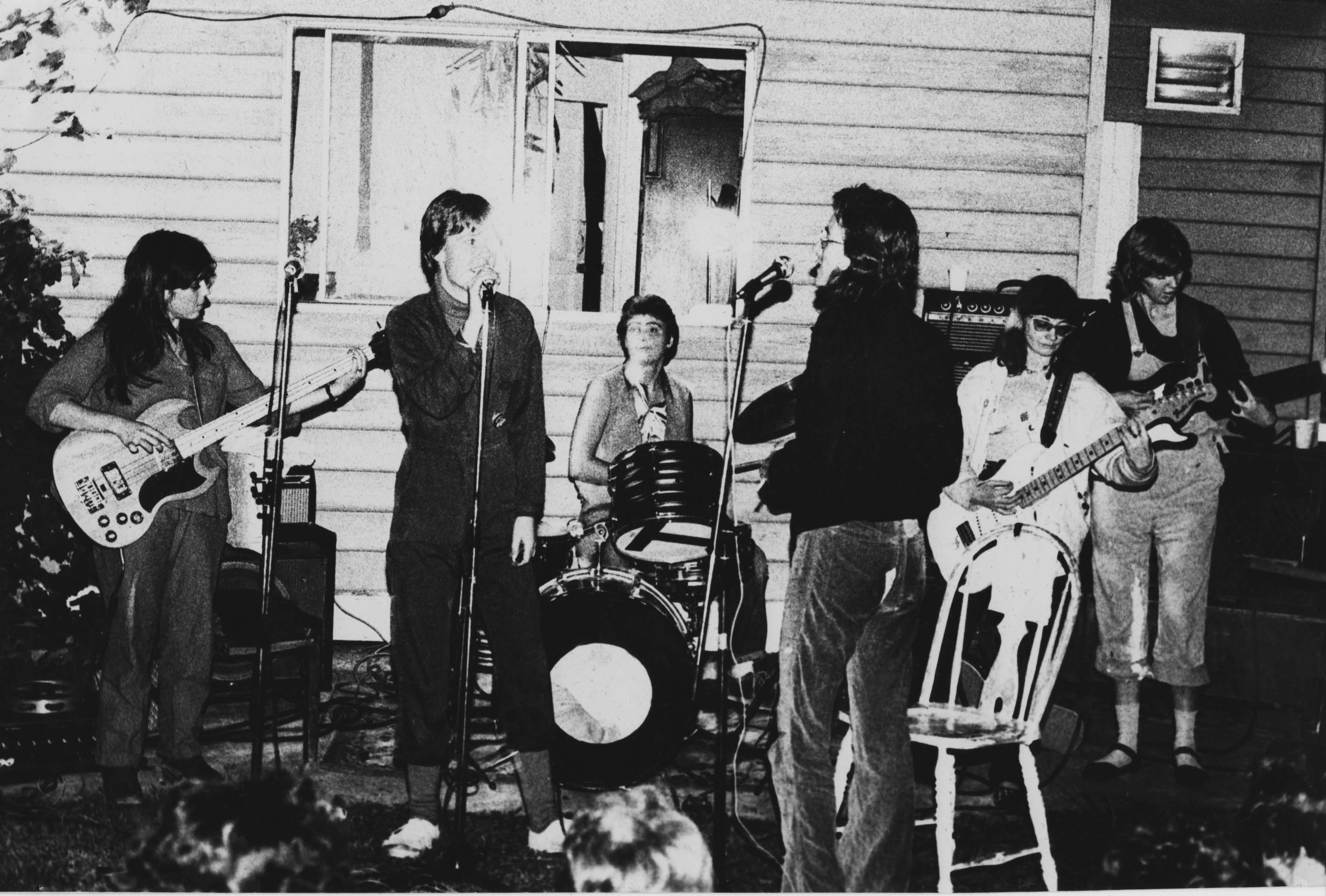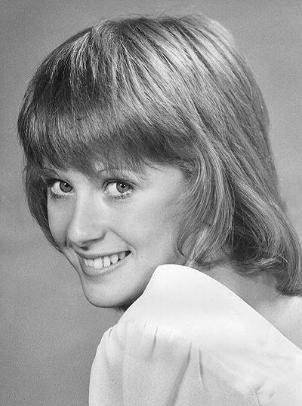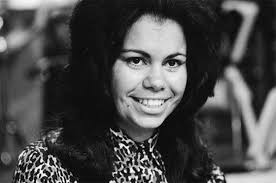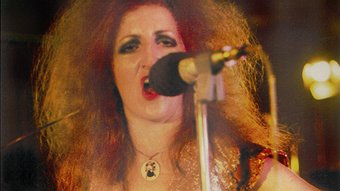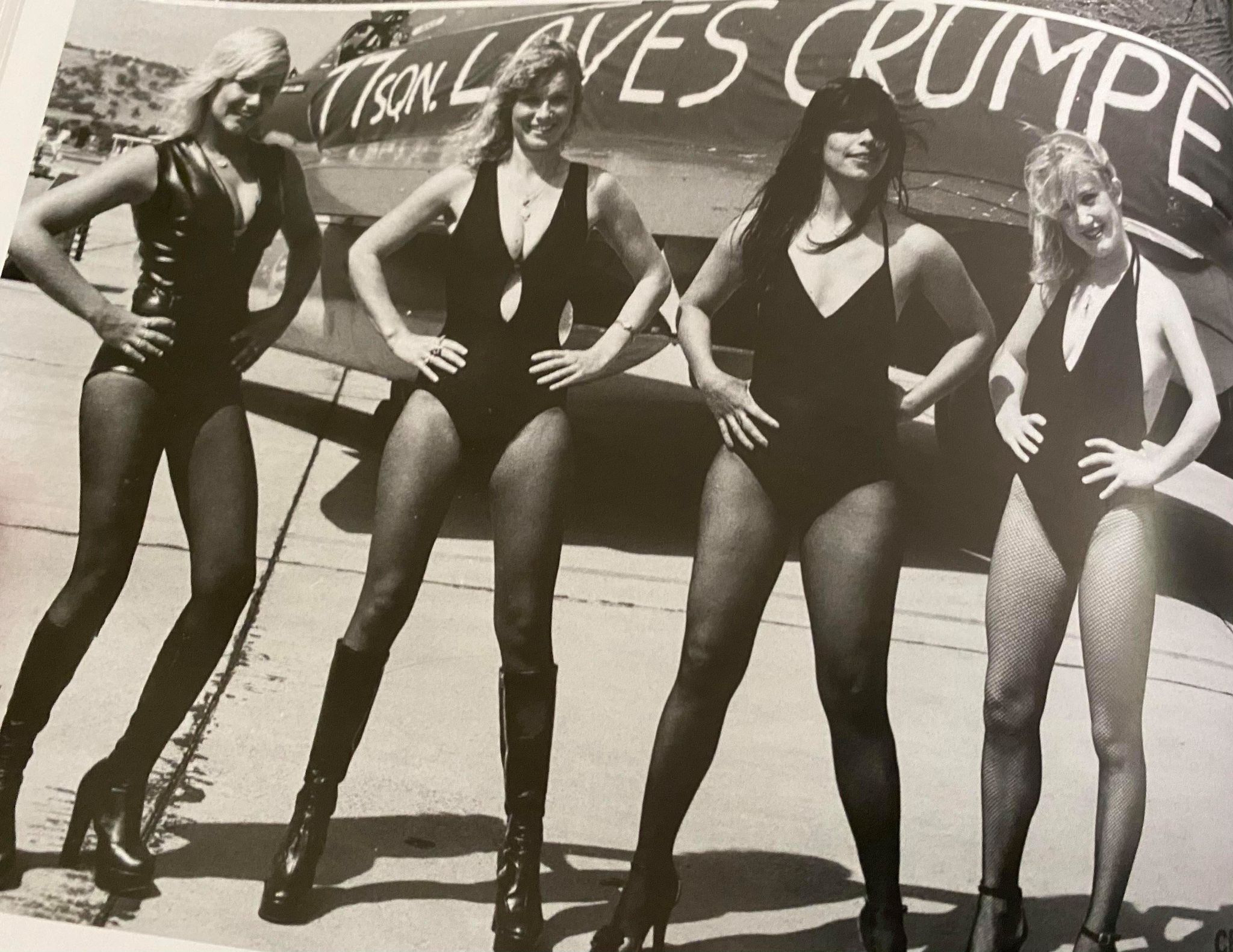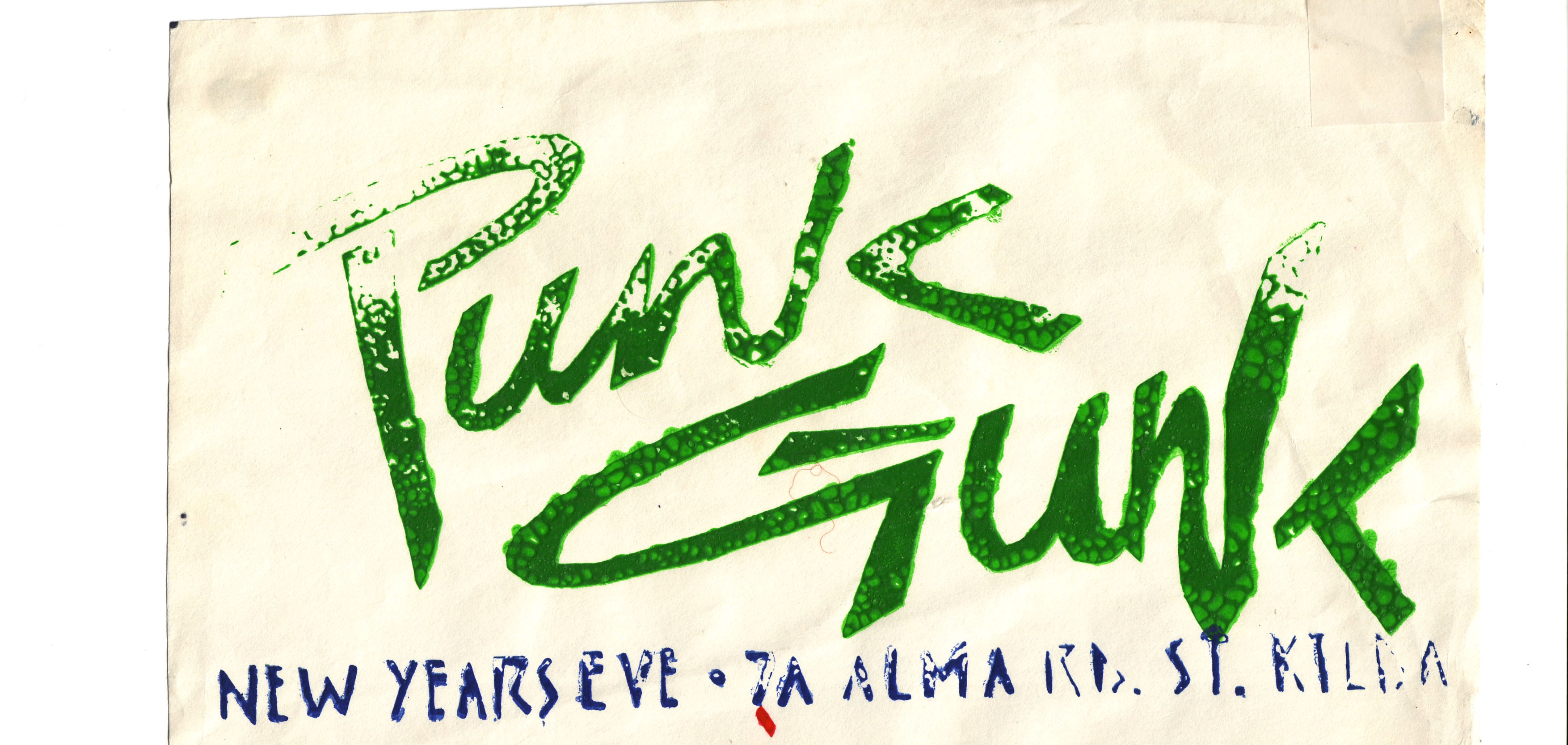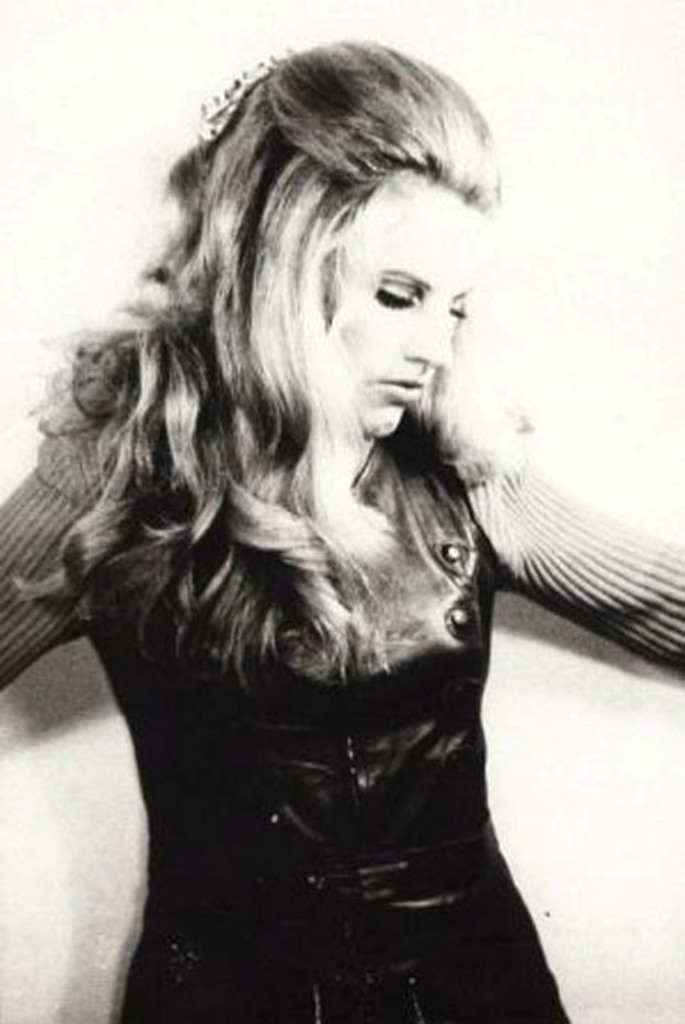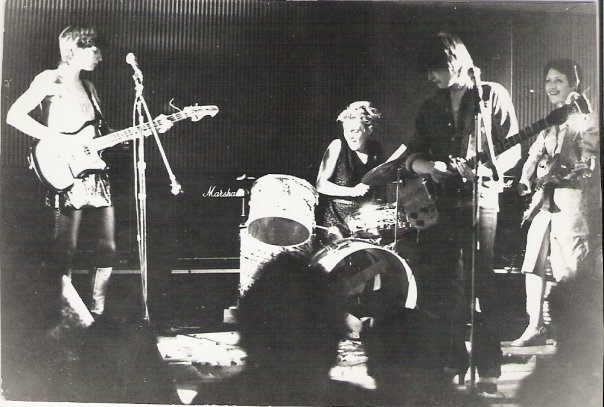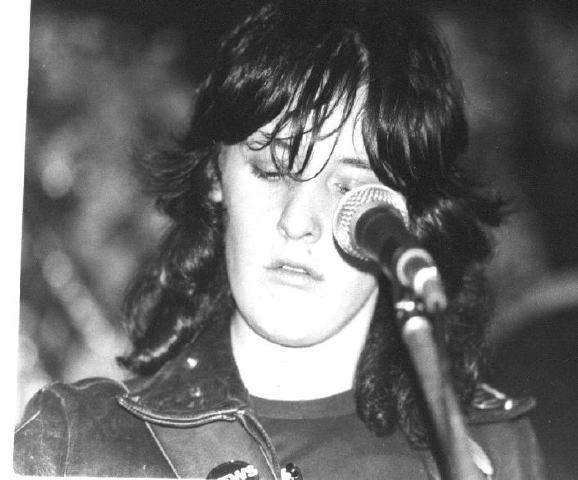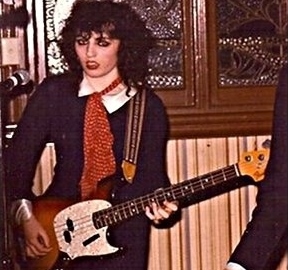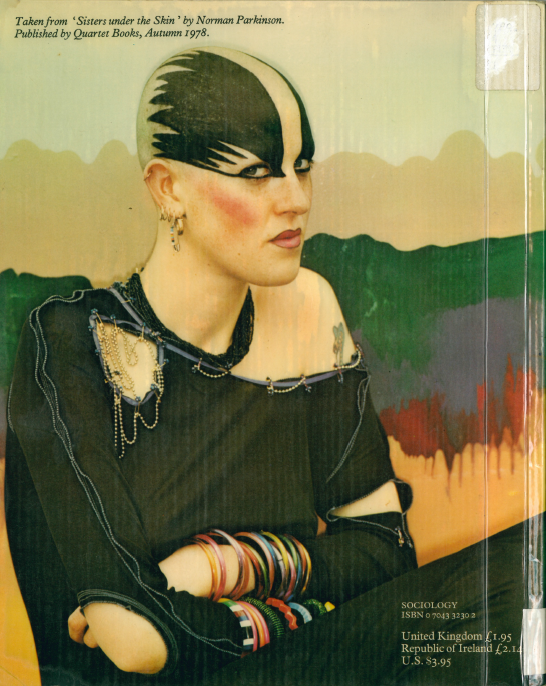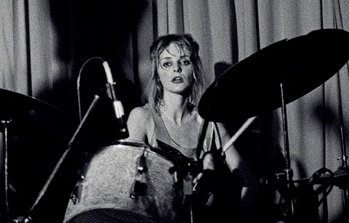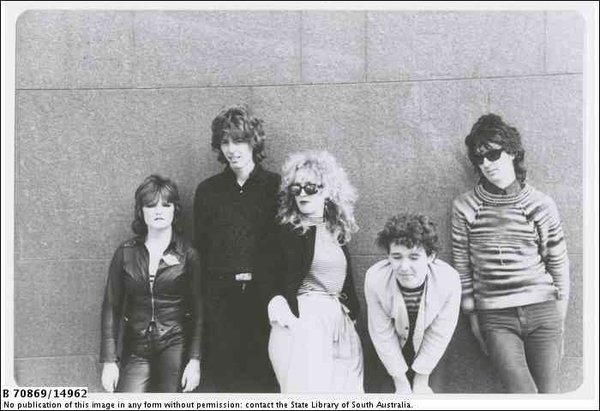The Second Wave of Feminism:
By the early 1970's the feminist movement (pictured) had begun to
impact on Australian society. When Germaine Greer published The Female
Eunuch in 1970 a whole generation of women became involved in the second
wave of feminism - The suffragettes represented the first wave, when earlier
this century, they agitated for the right for women to vote. The 'second wave' feminists recognised that women had been
discriminated against, that there was a role expectation by society for women
to be restricted to domestic roles and, because of that, there were few career
opportunities. Where women were working, they were paid lower wages and
expected to be subservient to men in the workplace.
Pub Rock:
Hotels and clubs became the environment in which most
Australian bands developed in the 1970's. This was known as the 'live circuit' and bands developed
their followings by constantly touring the 'pubs' and 'clubs'. The circuit
promoted hard rock, masculine bands like AC/DC and Cold Chisel -
music that works better in pubs than in any other venue. This was the
traditional home for the Australian male. The new generation of boys was
rocking to the bands of boys that dominated this scene. It allowed males a
chance to practice their performance skills and musicianship while women were
still treated as if they didn't belong in this environment. With the domination of pub rock in the 1970's, bands
continued to thrive but solo artists, especially women, suffered.
Renee Geyer (pictured), however, was an exception to the rule. Renee Geyer was a
star with her huge bluesy voice and rock star attitudes. She was influenced by the American soul sound which has been the hallmark of her
career. Renee worked the live circuit in pubs and clubs throughout
the '70s and maintained a huge live following.
Her first album released in 1973 was called "Renee
Geyer". Her second album, in 1974, was called "It's a Man's Man's
Man's World" The title track, an old James Brown song, became her first
hit. Her biggest hit in 1977 was "Stares and Whispers."
Her other hits include "Heading in the Right Direction" and "Say
I Love You". Over the next two decades, Renee recorded 17 albums, nine of
which went gold. She also had a number of hit singles and she has toured
extensively in Australia and overseas. She lived in the States during the
eighties and early nineties writing for or touring as a backup singer with
Sting, Neil Diamond, Chaka Khan and Joe Cocker. Watch a 1973 interview with Renee Geyer.
Another female singer who forged her own path was Wendy Saddington (pictured), is a blues, soul and jazz
singer who was in bands Chain in 1969, Copperwine in 1970, and later the
Wendy Saddington Band. She wrote for teen pop newspaper 'Go-Set' from September
1969 to September 1970 as an agony aunt in her weekly "Takes Care of
Business" column, and as a feature writer. Saddington had a wild appearance with heavily made-up eyes, a huge afro, and she usually wore copious beads and bangles, with a pair of Levis and a cheesecloth top. She had Top 30 chart
success with her 1972 solo single "Looking Through a Window", which
was written and produced by Billy Thorpe and Warren Morgan of the Aztecs.
Jane Clifton was the lead singer in a pub rock band, Toads in 1975. In the following year Clifton formed rock, pop group Stiletto. The group provided three tracks, "Nights in Parlour", "Cream" and "The Man", for a Various Artists' album, Debutantes (1977).
I am Woman - Hear me ROAR!:
In 1966, Melbourne girl Helen Reddy (pictured) won the Bandstand International Contest
sponsored by Phillips
Mercury Records. Her prize was a trip to New York and a recording contract. Although she did
not receive the record deal that was ‘promised’ to her, she stayed in New York, and in
1970 she wrote and recorded "I am Woman", which was a direct reference to feminism. In December 1972 this song hit
Number One on the Billboard
charts. This was her first hit single after three prior releases. In 1973 she received a Grammy
for the Best Female Vocalist and in 1975 ‘The International Year of the Woman’, the United Nations used "I am Woman" as
their theme song.
During the mid-1970s and early 1980s, Australian women’s music flourished at women’s dances, feminist rallies, non-feminist pubs and clubs. The political imperatives of the second-wave feminist movement, including the creation of women-identified music and feminist community and cultural spaces, led to the formation of all‐women bands, largely self-taught, taking to the stage for the first time. These women’s music groups were integral to the Women’s Liberation movement in Australia,
With lyrics that focused on a feminist message, bands such as Mystical Miss, Clitoris, Shameless Hussies, The Lavender Blues, (who became the first of these bands to release a record, Wake Up Sister in 1978), Razor Cuts, The Ovarian Sisters, The Stray Dags, Toxic Shock (pictured) (who sang about the effects of unsafe chemicals in tampons), and Foreign Body all recorded tracks in the late 1970s and early 1980s, with many of these tracks being released on both vinyl and tape, with all releases being self-funded by the bands themselves. Listen to the soundtrack from the documentary Brazen Hussies, to hear many of these all-female groups.
POP!:
Debbie Byrne (pictured), is an Australian pop singer, variety entertainer, theatre and TV actress and writer, director and choreographer of cabaret. From 1971 to 1975 she was a founding cast member of Young Talent Time. She started her solo singing career with a cover version of "He's a Rebel" (March 1974), which peaked at No. 25 on the Go-Set Australian Singles chart. At the Logie Awards of 1974 she won Best Teenage Personality and followed with the Queen of Pop Award in October – both ceremonies were sponsored by TV Week. She repeated both wins in the following year.
Marcia Hines arrived in Australia in the 1969 to star in the rock opera Hair. She then scored the role of Mary Magdalene in Jesus Christ Superstar. After an enormously successful run, she decided to remain in this country and had a string of hit singles throughout the 1970's. Marcia had two top charting albums in 1976, "Marcia Shines" and "Shining", and the top 10 charting albums of 1977 and 1978. She had her own TV series on the ABC in 1978 and 1979 called "Marcia Hines Music."
Wendy Stapleton is an Australian pop/rock singer-songwriter, who has performed as a backing singer, session musician and a solo artist; she fronted various Melbourne -based groups including Wendy Stapleton Band (1976–1978) and Wendy & the Rocketts (1980–1985). which had a top 30 hit single with "Play the Game" in June 1983.
Country and Folk Music:
Judy Small was a folk singer and songwriter who began her musical career in the late 1970s. Known for her feminist and political songs, usually following a traditional theme, she produced twelve albums, hundreds of songs and has been described as being among the most popular political singers in Australia.
An Arrente woman from Alice Springs, Auriel Andrew (pictured) began her musical career in the late 1960s, ‘cutting her teeth’ on the local live music circuits in Adelaide and Port Lincoln. She appeared on various live TV musical broadcasts before she became a regular on Channel Nine’s 'Country and Western Hour', hosted by Reg Lindsay. In 1973 she moved to Sydney, and toured with renowned Aboriginal performer Jimmy Little. Auriel went on to perform at the grand opening of the Sydney Opera House and sang "Amazing Grace" in Pitjantjatjara for Pope John Paul II during his Australian tour in 1986.
Verity Truman (flute, saxophone, tin whistle, vocals) formed Redgum in Adelaide in 1975 with singer-songwriter John Schumann and Michael Atkinson on guitars/vocals.
Also worthy of a mention is Adelaide-based Sister Janet Mead, who recorded a rock version of "The Lord's Prayer" in 1974 (with a young Clare Moore on drums). The music was written by one of her congregation - Arnold Strauls - and remained in the Australian charts for 19 weeks. It reached Number Four in the US and was released in 31 different countries selling over two million copies.
Jazz and R & B:
Ruby Carter, the jazz matriarch of Melbourne and St Kilda
icon, came to Melbourne in 1973 and made an indelible mark on the local jazz
scene and the St Kilda community with her long-term residency at the Hotel Esplanade called 'Ruby Tuesday'.
Carol Lloyd (pictured) was a singer, songwriter, composer, and advertising executive. She was described as "Australia's original rock chick" for her role in the Brisbane-based bands Railroad Gin (1973–75) and Carol Lloyd Band, as well as her solo career. She was recognised for her long, curly red hair, which was insured with Lloyd's of London for $100,000.
All-Female Acts:
Crumpet (pictured) was an all-female glam/rock band formed in Perth in the mid-1970s. The band had plenty of work around the city at venues like The Morley Park Hotel. Crumpet had a lot of lineup changes during its five year tenure.
Sweet Jayne was the original Australian all-girl hard rock band who formed in 1977. They performed over 700 gigs in six years, playing a mix of hard rock and heavy metal covers and a repertoire of over 50 original songs, written by Chris Scheri and Cris Bonacci.
Chicks Incorporated were an Australian dance rock band formed in Brisbane, Queensland in 1977 and they attracted a lot of local attention due to their sexy appearance and wild dancing.
Shrew performed in 1976 and 77. They were an all-female acoustic band with members playing clarinet, saxophone, piano and guitar. Their repertoire consisted mainly of covers of 1940s pop songs.
In Brisbane an all-female punk band called Zero (Xero) started playing in the pubs in 1978. The band started out by performing Patti Smith and other punk covers before moving on to write their own material. Members from the band included Lindy Morrison, who later played the drums in the Go-Betweens, Deborah Thomas (pictured) who would go on to become the editor for Cleo Magazine, Elle Magazine and the Australian Women's Weekly, Irena Luckus and Nicki Nought. Lindy Morrison said she left in 1981 because "they wanted drum-machines and synthesisers." On Morrison's departure Zero became Xero.
Peaches were an Australian pop music girl group who were active in the late 1970s with Margaret Kirk on lead vocals and guitar (a.k.a. Margaret Britt, ex-The Vamps) and Sue Kirkby (ex-Daughters of Zeus) on bass guitar. They were championed by record producer, Gene Pierson, who referred to them as Australia's first all-female pop band.
Raelene Citizen & The Outskirts formed in Melbourne in 1978.
Foreign Body was a rock band from Adelaide active from 1978-1981. They released the single "Gang Land / Nothing Yet" on their own Good Bunch label, pressed by EMI Custom in 1981.
Other all-female bands formed in Adelaide in the late 1970s included Grand Larceny, Foreign Body, Ignorant Youth, Rim of Hell, and Plague of Cats.
Punk and New Wave:
The
origins of punk stem from the youth-led reaction to the political landscape
that was occurring in both the USA and the UK in the mid-to-late 1970s. Punk
bands rejected the corporate nature of mainstream 1970s rock music. Instead,
they produced short, fast-paced songs with hard-edged melodies and singing
styles, with stripped-down instrumentation (often a song would consist of just three
chords). Punk lyrics typically revolved around anti-establishment and anti-authoritarian themes.
Punk also embraces a DIY ethic; with many bands self-producing recordings
and distributing them through independent labels.
The basic ideology behind punk music was that anyone could play this music,
and that anyone who wanted to express themselves in this way to do so. This was the
ideology that allowed women the medium to actively participate as instrumentalists and as singers
and songwriters in the punk music scene.
In the UK a bunch of young, angry,
hungry bands started performing their loud
music. There were all- girl bands like The
Slits and The Raincoats,
and in the USA, there was the rise of female artists like Debbie Harry
from Blondie and Patti Smith. The major impact of punk music in Australia was that females were finally allowed some access to
the stage.
St Kilda
Punk:
In 1977 St Kilda was a degenerate suburb filled with
prostitutes, drug addicts and alcoholics; a breeding ground for violence and
decay but also for decadence and excitement. As punk bands were being formed,
live music venues were in dire need, and thus with the birth of the Melbourne
Punk scene also came the birth of some of Melbourne’s most iconic underground
venues.
Dolores San Miguel:
Band Promoter, Dolores San Miguel (pictured), took charge of booking local
punk bands at St Kilda’s notorious punk venue ‘The Ballroom’ in 1978, dubbing a
small side room that was located upstairs as the ‘Wintergarden Room’. The monthly success of these gigs meant that
Dolores was eventually given the keys to the main ballroom, where she was able
to book bigger acts and attract larger audiences; Her New Year’s Eve gig in1978
attracted 1000 people.
Monthly gigs soon became weekly events, but the success that
Dolores had created soon caught the attention of another (male) entrepreneur,
Laurie Richards, who was able to attract popular interstate and international
acts. He took over the venue in February 1979 and renamed it the ‘Crystal
Ballroom’ because of the venue's ornate ballroom and chandeliers (it was also
called The Seaview Hotel and The Seaview Ballroom). This change of hands, however,
did not deter Dolores from continuing in her role as band booker and promoter,
and she continued to book bands at inner-city venues such as The Exford Hotel and
the ‘475 Club’, before returning to run ‘The Paradise Lounge’ at the Seaview Ballroom.
The Little Bands:
The 'Little Bands' scene was a sub-scene that occurred as a
parallel to the more formalised Melbourne punk band scene from 1979-1980. Individuals
would often come together spontaneously to form bands who would then play their
own niche brand of clangy and discordant music for no more than two gigs, for
no more than 15 minutes. With names like Thrush and the Cunts (pictured), Ronnie and
the Rhythm Boys, Too Fat to Fit Thru the Door, The Take and The Incredibly
Strange Creatures Who Stopped Living and Became Mixed Up Zombies, Twenty-one of
the Little Bands had at least one woman in the band including DeniseR, Marie Hoy, Wendy Joy Morrisey, Marissa Stirpe, Jules Taylor, Virginia Kane and Kate Buck.
Women in Punk/Post-Punk Bands:
Lisa Gerrard was not only a member of the Little Bands, but
she was also the lead singer of post-punk band Microfilm and would later
achieve fame by being part of Dead Can Dance.
Julie Jordan (pictured) also known as Joy Relentess was the bass player
for 1970s punk band Babeez, one of Melbourne’s original Punk bands. Janine Hall played Bass in the 1977 band Young Charlatans,
with Rowland S. Howard and Ollie Olsen. Hall joined Chris Bailey's incarnation
of The Saints upon his return to Australia in 1980.
Catherine McQuade (pictured) was bass player in Melbourne art-punk
outfit, The Ears who became one of the most popular bands on the Melbourne
inner-city / Crystal Ballroom scene. McQuade went on to join Deckchairs
Overboard. Rosalyn Deer
was the singer in The Editions, the first band that St Kilda icon Fred Negro
was in. Laine McCready was the lead vocalist with 1980s punk/new wave band International Exiles. They released two singles and the disbanded.
Margot O'Neill sang in post-punk band The Jetsonnes and Barbara Hogarth was the bass player firstly in Government
Drums and then Essendon Airport - a post punk group out of Melbourne in the early 1980s. After the break-up of the band in 1983, Hogarth, set about forming the commercial, funk-pop band I'm Talking with Kate Ceberano
and Zan Abeyratne on vocals.
In Sydney The Screaming Abdabs were
assembled in early 1978 as a vehicle for vocalist Carmel Strelein (pictured). A true
iconoclast, Carmel cultivated a wild sense of personal style that made her
instantly recognisable in the formative Sydney punk scene: shaved head, exaggerated
eye make-up extending across her scalp, tattoos, piercings and outlandish
custom altered clothes (notably, a knitted jumper with three arms, the extra
limb stuffed to accentuate its strangeness).
Rae Macron Cru was the lead vocalist of punk
band Voigt/465. She joined in 1976 from a group of school-friends. Voigt/465
were highlighted as the "band of 1979" in Clinton Walker's
influential book Inner City Sound, a document of punk and
post-punk music in Australia. When the band broke up in 1979, she joined Wild
West.
XL Capris was an indie-punk band formed by Johanna Pigott in 1978, for whom she performed bass guitar, vocals, keyboards and guitar, whilst also going by the stage name 'Alligator Bagg'. Julie Anderson (pictured) aka 'Nancy Serapax' played drums in the band. They released two albums, "Where is
Hank?" in 1980 on their own Axle Label and in 1981 "Weeds" through
the Powderworks record label.
Formed in 1978, Friction had Helen Carter (later of Do Re Mi), Ruby Davies, and Fiona Warner in the band. Suicide Squad were a female-fronted punk band from Sydney who formed in 1978 with Annie on vocals. They built a reputation as a great live band and released their single, "I Hate School b/w "New Kid's Army" on Doublethink records in 1980.
In 1978 Angie Pepper first came to notice as vocalist for
the post-punk independent Sydney band The Passengers, who produced one single, "Face
with No Name" on the Phantom label. Astrid Spielman was the lead singer of 1970s post-punk band
The Particles. They released a 7" EP entitled 'Colour-In' in 1979. Despite
the obvious low budget nature of the recording, it was quickly included on
radio stations playlists including Melbourne's 3RRR-fm as a pop classic.
Suicide Squad formed in 1978 in Wollongong New South Wales, the band were four school friends, with Annie Barrett on vocals. The band later relocated to Sydney and built a reputation. They later recorded a LP before splitting up.
From 1979-1980 Shy Impostors shook up Sydney's inner city live music scene. Fronted by singer-songwriter Penny Ward, they played infectious, raucous and melodic pop music.
In Adelaide, Sputniks (pictured) formed in 1979, with “one of the
most throat-destroying female singers in the world”, Liz Dealey on vocals/guitar
and Clare Millionaire (a.k.a. Clare Moore) on drums. Over the next year, before
a move to Melbourne, they proved themselves extremely hardworking and put
together an impressive list of achievements.
Melbourne singer Karen Marks also found her footing in music,
first through rock journalism and then in band management with synth-punk band
JAB in 1978 and later with Models, who became one of the fastest rising new
bands of the post-punk movement. In 1980 Marks, with the creative assistance of former JAB and Models member Ash
Wednesday, released her now iconic cold-wave track “Cold Café”.
Spaces and Places:
In 1979 'The Women's Warehouse'was established in Haymarket, Sydney. It was a cultural centre for a variety of pursuits. One room, a converted meat freezer, became the birthplace for at least four all girl bands: Hen's Teeth, The Stray Dags, Escargo-go and The Other Band.
Another famous Sydney venue that encouraged all girl bands was Frenches. Bands like Garbo with Faye Reid(pictured), Judy Costello on drums and Nancy Keil on vocals performed regularly at this venue. This band turned into the Party Girls in the early 1980s.
Other female Singers/Musicians/Acts of this era include: Alison MacCallum, Allison Durbin, Andi Eisenhuth, Annalisse Morrow, Anne Harkin, Anne Infante, Bobbi Marchini, Christie Allen, Claire Morrison, Faye Lewis, Fiona Graham, Ingrid Spielman, Jane McGee, Judy McGee, Kelly Skinner, Kate Delaney, Kim Durant, Linda George, Lynne Dutton, Lynda Nutter, Louisa Wisseling, Lindy Allen, Margaret Goldie, Margaret Gillard, Mopsie (a.k.a. Elizabeth Ward), Maybelline Broadbent, Mary Jane Carpenter, Mary Azzopardi, Marilyn Hodgson, Maggie McKinney, Noosha Fox, Pam Tamblyn, Penny Dyer, Rose Bygrave, Sally Boyden, Sharin Anderson, Su Cruickshank, Shauna Jensen, Sharyn Cambridge, Sharon Sims, The Moir Sisters.
Interesting Facts:
In 1972 a group of prominent women
activists formed the Women's Electoral Lobby (WEL) and campaigned for equal
pay, equal access to education and equal
employment opportunity. Programs
such as Affirmative Action, Anti Discrimination
and Equal Employment Opportunity were initiated.
In 1972, The Commonwealth conciliation and Arbitration Commission ruled that "Equal Pay for Work of Equal
Value" be fully implemented by 30 June 1975.
In 1972, the Federal Child Care Act provided Federal involvement and funding
for child care.
In 1973 Elizabeth Reid was appointed adviser to the Prime Minister, Gough Whitlam, on /natters relating to women - The first such position in the workl
In 1975 the first Sex Discrimination Act in Australia was passed by the South Australian Parliament.
In 1975 the Family Law Act 1975 was passed by the Federal Parliament. This established no fault' divorce. Before this you had to prove grounds to gain a divorce - adultory and extreme cruelty/abuse were common grounds. The courts gave women more favourable custodial and property rights. The courts recognized that a woman's role as wife and mother was equal to the breadwinner role.
Photo Credits:
Women on the march wave their placards at the International Women's Day march, Melbourne, March 8, 1975 - McKinnon, John & Australian Information Service - Source: NLA
Renee Geyer, 1973 - Source: YouTube
Wendy Saddington, c. 1972 - Source: Alchetron
Crumpet, mid 1970s - Source: Women of Aussie Music
Deborah Thomas, Zero, 1978 - Source: Australian Women in Rock and Pop Music
Helen Reddy, c. 1972 - Source: Facebook: Helen Reddy
Toxic Shock, c.1979 - Source: Sylvie Leber
Debra Byrne, c.1974 - Source: Discogs
Auriel Andrew, c. 1973 - Source: NFSA
Carol Lloyd, c. 1974 - Source: Rock on Vinyl
Punk Gunk poster image, 1977, designed by Philip Brophy - Source: Punk Journey
Dolores San Miguel, c. 1966 - Source: Dolores San Miguel / Punk Journey
Thrush and the Cunts, 1979 - Photo by Janis Lesinskis - Source: Punk Journey
Joy Relentless, c. 1978 - Source: Gavin Quinn / Punk Journey
Catherine McQuade, The Ears, c. 1979 - Source: Women of Music
Carmel Strelein, The Screaming Abdabs, 1978 - Photography by Norman Parkinson - Source: Wallaby Beat
Julie Anderson, c.1978 - Source: Women of Music
Sputniks, 1979 with Liz Dealy and Clare Moore - Source: State Library of South Australia
Faye Reid, c. 1980 - Source: Australian Women in Rock and Pop Music
